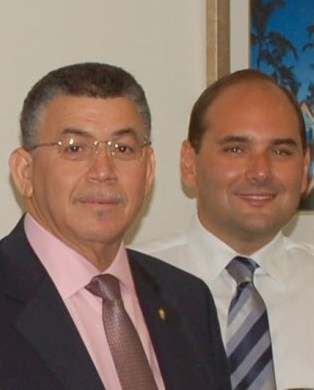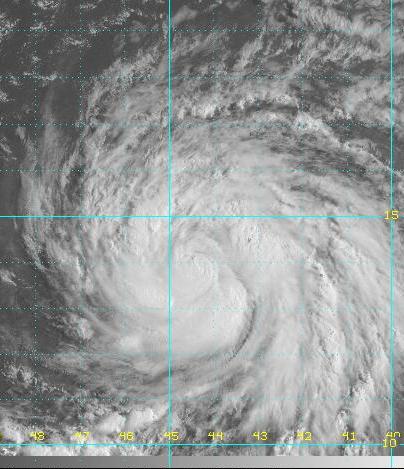Archive for August 17th, 2009

Woman burglar arrested after chase by off duty cop
Uniformed officers from George Town police station responded to the location and the woman was arrested in the Sunrise Apartments area. Investigations carried out at the scene revealed that the woman had allegedly attempted to break into a home on Old Crew Road but was disturbed by the occupier. She ran from the house spurring the off-duty officer, who happened to be in the area at the time, to give chase. Police said that the woman remains in police custody at this time.
If you like this article, click here to find out how to support CNS

New financial services ministry to focus on PR
 (CNS): Outlining objectives for the his new ministry, Leader of Government Business and Minister of Financial Services McKeeva Bush stressed the importance of a properly funded marketing and promotional programme to address the reputation crisis being experienced by the industry. Along with the marketing and lobbying initiative he said there would be revisions to immigration policy and other legislation and the establishment of a financial services secretariat.
(CNS): Outlining objectives for the his new ministry, Leader of Government Business and Minister of Financial Services McKeeva Bush stressed the importance of a properly funded marketing and promotional programme to address the reputation crisis being experienced by the industry. Along with the marketing and lobbying initiative he said there would be revisions to immigration policy and other legislation and the establishment of a financial services secretariat.
He also stressed the importance of harmonising all facets of government’s financial services operations. “We are all part of one family, sharing a common goal,” Bush said. “I encourage you to work closely together and indeed, to communicate regularly. With help from each of your organisations added to our partnership with the financial services industry, I am hopeful that we can achieve our objectives.”
According to a GIS statement, the LoGB emphasised the importance of taking an holistic approach, saying that each area would be taken into account when addressing the long-term future of the financial industry.
He said the financial services secretariat would be tasked with developing and protecting the financial services industry, and would also provide research and policy advice to the ministry, coordinate public relations and marketing, and provide legal expertise for drafting legislation.
"In our approach to regulation we must strike a delicate balance between risk management and commercial success,” Bush added. “Our approach to cooperation on tax matters must demonstrate full commitment to the international efforts of organisations such as the OECD (Organisation for Economic Cooperation & Development) and the EU (European Union).”
At the meeting each entity presented its strategic initiatives for the year ahead and learned more about the Ministry’s vision for Cayman’s financial services industry. Participating in the retreat were representatives from the Cayman Islands Monetary Authority and Stock Exchange; the Tax Information Authority; the Registrar of Companies; the Public Relations Unit, the Cayman Islands Development Bank, the Tax Information Exchange Negotiation Team and the Financial Services Council.

Cost of CORE
CUC introduced the Consumer Owned Renewable Energy (“CORE”) programme in January of 2009 following approval by the Cayman Islands Electricity Regulatory Authority (ERA). The principle feature of the program was to allow connection of renewable generation to CUC’s transmission and Distribution grid and to credit CORE customers for energy produced.
The credit given to the CORE customer is 100 % of CUC’s savings generated from the displacement of its own diesel generated electricity costs. With the current relatively low cost of fuel, this credit is much less than the cost of producing the CORE energy. Simply put, the cost of CORE generation is greater than the cost of CUC generation and for CUC to buy energy from the CORE customer, at their cost, would be to do so at costs which are higher than CUC’s own generation costs.
CUC, the Government and the ERA, recognized the importance of introducing sustainable renewable energy to CUC’s portfolio of generation, understanding that it would likely be more expensive in the short term, but could become cost competitive in the future if diesel fuel prices increased or the cost of renewable energy went down.
Accordingly, clause 32.5 of CUC’s Electricity Transmission & Distribution Licence (which you may read in its entirety on the CUC or the ERA website) specifically states with respect to renewable energy that, “To reduce the dependence on fossil fuels and encourage renewables the Licencee may propose (with justification) that such purchases of power take place at prices at or above those of its most economic short run alternative (the Licencee’s avoided cost), a cost that would be passed on to consumers.”
In keeping with the intent of the License, CUC has made more than one proposal to the ERA which provides greater incentive to the CORE customers than the present CORE rate and would likely attract more CORE participants if implemented. These proposals could achieve results similar to “net metering”. It is our understanding that the ERA is awaiting a policy direction from the Government before it can approve any such rates or incentives and we trust that this will occur in the not to distant future.
In a related initiative, CUC has launched a request for proposals (RFP) process for qualified wind developers to develop, install, commission and operate wind generation of up to 10 MegaWatts. Independent development of this generation source by experienced qualified developers will validate the economic viability of this technology. CUC will not participate as an investor in this project but will purchase resulting generation at an agreed upon rate (approved by the ERA) for distribution through the electricity grid.
CUC recognizes and supports the efforts of those on the island who have taken the initiative to install CORE generation for environmental reasons. We believe that further incentives will expand that group of early adopters for the long term benefit of the island and will recognize the contribution made by those who have already adopted renewable technologies.

Cocaine on 90% of US cash
 (Science Daily): You probably have cocaine in your wallet, purse, or pocket. Sound unlikely or outrageous? Think again! In what researchers describe as the largest, most comprehensive analysis to date of cocaine contamination in banknotes, scientists are reporting that cocaine is present in up to 90 percent of paper money in the United States, particularly in large cities such as Baltimore,Boston, and Detroit. The scientists found traces of cocaine in 95 percent of the banknotes analyzed from Washington, D.C., alone.
(Science Daily): You probably have cocaine in your wallet, purse, or pocket. Sound unlikely or outrageous? Think again! In what researchers describe as the largest, most comprehensive analysis to date of cocaine contamination in banknotes, scientists are reporting that cocaine is present in up to 90 percent of paper money in the United States, particularly in large cities such as Baltimore,Boston, and Detroit. The scientists found traces of cocaine in 95 percent of the banknotes analyzed from Washington, D.C., alone.

Tradition lifts Hedge Funds
 (FT.com): Hedge funds have made the best start to a year in a decade as markets recover and the industry moves back to traditional investment strategies. The average hedge fund has had its best first seven months since 1999, according to the HFN aggregate index of hedge funds, which has risen 12.14 per cent in the year to date. The Credit Suisse/Tremont index of the hedge fund universe, which will report its July numbers this month, is expected to be up 9.7 per cent for the seven-month period. Several of the world’s biggest funds have reported stellar returns over the past seven months – including many of those that had a particularly difficult 2008.
(FT.com): Hedge funds have made the best start to a year in a decade as markets recover and the industry moves back to traditional investment strategies. The average hedge fund has had its best first seven months since 1999, according to the HFN aggregate index of hedge funds, which has risen 12.14 per cent in the year to date. The Credit Suisse/Tremont index of the hedge fund universe, which will report its July numbers this month, is expected to be up 9.7 per cent for the seven-month period. Several of the world’s biggest funds have reported stellar returns over the past seven months – including many of those that had a particularly difficult 2008.

Secret donors support education of local kids
 (CNS):
(CNS):
Seeking additional help in this time of economic challenges, the Director is encouraging other church congregations and corporate sponsors to step forward. “These days, some families are simply unable to properly equip their children for school,” she said.
Donations of books, school uniforms, shoes and socks and other supplies will be received centrally and distributed through DCFS offices on Grand Cayman and Cayman Brac.
The DCFS is also seeking monthly sponsors for school lunches. Donations can be paid either to the department or directly to the schools. While recipients will not be named, donors can learn their gender and ages if they choose.

Special cops hit the beat
 (CNS): Twenty special constables were welcomed to the ranks of the Royal Cayman Islands Police Service (RCIPS) by the Commissioner David Baines last Thursday, 13 August at a graduation ceremony at the RCIPS Training Department in Governor’s Square. Commending them for taking the opportunity to serve their community, as specials are volunteers, Baines reminded the special constables that the oath of office signified their transition from civilians to officers with the responsibility to uphold the law.
(CNS): Twenty special constables were welcomed to the ranks of the Royal Cayman Islands Police Service (RCIPS) by the Commissioner David Baines last Thursday, 13 August at a graduation ceremony at the RCIPS Training Department in Governor’s Square. Commending them for taking the opportunity to serve their community, as specials are volunteers, Baines reminded the special constables that the oath of office signified their transition from civilians to officers with the responsibility to uphold the law.
“You carry my utmost admiration. Do your best to make our communities feel safe, remembering that your professionalism and kindness will remain with those you serve for a long time,” he told them.
Inspector Anthony White PhD, Head of Training said that training selfness people was a privilege. “These individuals have decided to assist in maintaining a peaceful Cayman Islands. They do this as part of a civic duty and nothing more as they receive no remuneration.”
The ceremony followed a 12-week training course that gave instructions on legal and procedural requirements expected of the officers.
Also attending the ceremony were Commandant Richard Harris and Assistant Commandant Carolyn Parker of the Special Constabulary, family members, friends and colleagues of the graduates.
As volunteer police officers, special constables are not paid – they are also known as ‘specials’ and are members of the community who commit at least 12 hours per month to the Police Service.

Gibraltar still on ‘grey list’
 (Gibraltar Chronicle): GSLP/Liberal Opposition has challenged the Government to explain why Gibraltar remains on the OECD grey list whilst other territories are being removed. In a statement the Opposition notes that the Government has now also signed a Tax Information Exchange Agreement with New Zealand. This brings the total number of such agreements signed by Gibraltar up to four. “Once again, the Government have failed to make an announcement in Gibraltar to alert professionals in our financial services sector to the fact that these agreements have been entered into, says Shadow Minister for Financial Services, Fabian Picardo.
(Gibraltar Chronicle): GSLP/Liberal Opposition has challenged the Government to explain why Gibraltar remains on the OECD grey list whilst other territories are being removed. In a statement the Opposition notes that the Government has now also signed a Tax Information Exchange Agreement with New Zealand. This brings the total number of such agreements signed by Gibraltar up to four. “Once again, the Government have failed to make an announcement in Gibraltar to alert professionals in our financial services sector to the fact that these agreements have been entered into, says Shadow Minister for Financial Services, Fabian Picardo.

Food costs up despite slump
 (CNS): In the face of the world economic downturn the cost of living in the Cayman Islands is still high, and while inflation has fallen Caymanians are faced with a whopping 7.5% increase in the average price of food, even though prices in the US have fallen dramatically. According to the Economics and Statistics Office’s (ESO) economic report for the first quarter of 2009, although the country is paying less on housing, clothing and transport, people are still facing increases when it comes to feeding the family.
(CNS): In the face of the world economic downturn the cost of living in the Cayman Islands is still high, and while inflation has fallen Caymanians are faced with a whopping 7.5% increase in the average price of food, even though prices in the US have fallen dramatically. According to the Economics and Statistics Office’s (ESO) economic report for the first quarter of 2009, although the country is paying less on housing, clothing and transport, people are still facing increases when it comes to feeding the family.
The ESO figures revealed that the Consumer Price Index fell by 0.1%, when compared to March 2008, mainly due to lower average prices of housing reflecting the dampening effect of the global recession on prices in source markets, along with the local economic downturn. The number of property transfers fell by 21.5% while the total value slumped by 35.8%.
Although utilities and clothing costs also fell, key expenses rose, including medical costs (4.0%) and education (2.3%), household equipment (12.5%) and food. The average price of food items increased by 7.5%, fruits and vegetables increased by 21.1%, oils and fats by 20.1% meat 11.0% and bread & cereal by 11%.
Around the world the previously high food costs began falling mid 2008 and have continued to do so as a world staples such as corn, soya beans and wheat have dropped in price. In the US — from where Cayman imports most of its food — prices have fallen more than 1.8% over the last 12 months.
The ESO did not indicate whether shipping costs have increased dramatically to explain why Cayman’s food basket has increased so much given the world economic climate.
With prices going up and the recession digging deeper it was no surprise that merchandise imports fell by 5.9% to register at $203.2 million. The ESO also noted that work permits fell by 2.8%, largely on accountof declines in hotel and condominiums, financial services, business services and construction.
Although the weighted average lending rate fell to 6.71% from 9.29%, as the prime lending rate fell to 3.25%, the country’s money supply expanded by 41.9%. The ESO said this was due to strong growth in quasi-money comprising primarily of foreign currency deposits held by residents, indicating the possible shifting of residents’ funds to lower risk but liquid assets in the light of the global financial crisis.
While mutual funds fell compared to the previous quarter by 165 or 1.7%, and bank and trust company registrations continued on a downward trajectory by 2.5%, the Cayman Islands maintained its position in international banking as total assets of all registered banks ranked fifth in the world. Insurance licenses rose by 3.4% but stock exchange listings contracted by 13.3% to settle at 1,550 while stock market capitalization for specialist debt increased and new company registrations declined by 44.2% to total 1,880.

Bill barrels on as 2009’s first Atlantic hurricane
 (CNS): Moving across the Atlantic at around 22 mph Tropical Storm Bill became a hurricane this morning, making it the first of the 2009 hurricane season. The storm was upgraded by the National Hurricane Centre in Miami this morning at 5:00 am AST. With winds of almost 75 mph, the centre of Hurricane Bill was located about 1160 miles east of the Lesser Antilles. NHC said that Bill’s general motion is expected to continue for the next 24 to 48 hours but is expected to strengthen and become a major hurricane by Wednesday.
(CNS): Moving across the Atlantic at around 22 mph Tropical Storm Bill became a hurricane this morning, making it the first of the 2009 hurricane season. The storm was upgraded by the National Hurricane Centre in Miami this morning at 5:00 am AST. With winds of almost 75 mph, the centre of Hurricane Bill was located about 1160 miles east of the Lesser Antilles. NHC said that Bill’s general motion is expected to continue for the next 24 to 48 hours but is expected to strengthen and become a major hurricane by Wednesday.
Hurricane force winds extend outward up to 30 miles from the centre but tropical storm force winds extend outward up to 145 miles out. Currently the NHC is predicting a north-west course for Bill keeping the Hurricane in the Atlantic and away from the Caribbean islands.
Ana, the first tropical storm of the season was again down graded to a tropical depression on Sunday as it moved towards the Dominican Republic later today. NHC said the poorly defined centre of tropical depression Ana was located about 95 miles of St. Croix at 5:00 am AST. Moving toward the west-northwest near 28 mph Ana’s maximum sustained winds are near 35 mph and little change in strength is forecast during the next couple of days and may degenerate into a tropical wave later today.
Meanwhile tropical storm Claudette which popped up in the Eastern Gulf of Mexico on Saturday morning was downgraded to a tropical depression as it made landfall on the Florida panhandle.